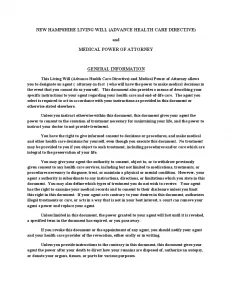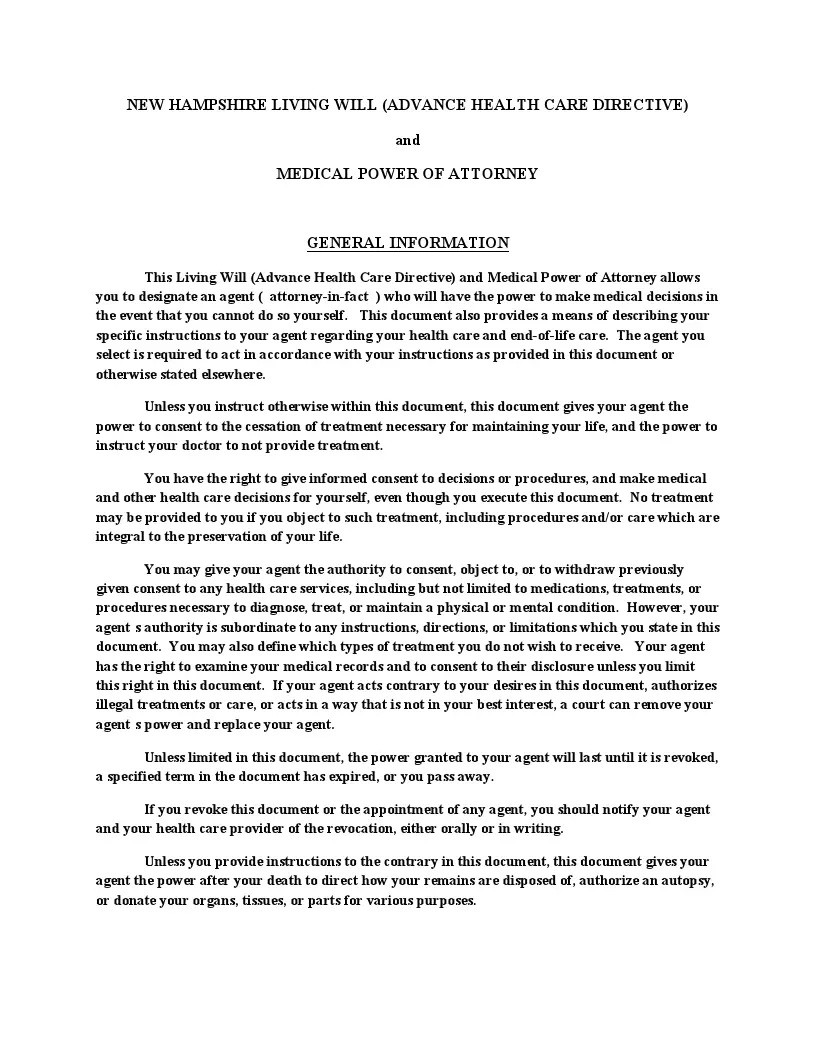Free New Hampshire Living Will Form
A living will form in New Hampshire, often called an “Advance Directive,” is a legal document that allows individuals to state their preferences for medical treatment in situations where they can no longer communicate their decisions due to illness or incapacity. A complete advance directive in New Hampshire typically includes two main components:
- Living will. This document specifies the types of life-sustaining treatments an individual would or would not want if they become terminally ill, permanently unconscious, or in a similar condition.
- Medical power of attorney. This form allows an individual to appoint a healthcare agent (a proxy or surrogate) to make medical decisions.
The New Hampshire living will form provides instructions regarding accepting or refusing medical treatment that could prolong life. A signed living will form becomes effective when it is delivered to the attending physician and the individual is determined to be incapacitated and either terminally ill or permanently unconscious.
Signing Requirements and Laws
In New Hampshire, the signing requirements and applicable laws governing living wills are meticulously outlined to ensure these documents are valid and enforceable. The relevant statutes are in Sections 137-J:1 to 137-J:23 of the New Hampshire Revised Statutes Annotated (RSA). These statutes detail the necessary steps to create a legally binding living will, specifying how it must be executed and witnessed and what it should contain.
To ensure that the living will is legally binding in New Hampshire, the document must be:
- Written while the individual is of sound mind.
- Signed by the individual or another person on their behalf, in their presence, and at their express direction.
- Witnessed by two individuals who are not related to the person by blood, marriage, or adoption and are not beneficiaries of the person’s estate./li>
This careful selection of witnesses helps protect the declarant from potential conflicts of interest and ensures that the document reflects their genuine wishes.
An advance directive executed in another state or jurisdiction, in compliance with the laws of that state or the laws of New Hampshire, is considered valid in New Hampshire. Healthcare providers in New Hampshire must follow these out-of-state advance directives as if they were executed under New Hampshire law.
New Hampshire Living Will Form Details
| Document Name | New Hampshire Living Will Form |
| State Form Name | New Hampshire Advance Directive |
| Signing Requirements | Two Witnesses or Notary Public |
| Validity Requirements | Sections 137-J:1 to 137-J:19 |
| Powers Limitation | Section 137-J:5 |
| State Laws: New Hampshire Revised Statutes, Sections 137-J:1 to 137-J:23 | |

Steps to Fill Out the Form
Follow these steps to complete your New Hampshire living will and medical power of attorney.
1. Durable Power of Attorney for Health Care
In Section I, you will appoint a health care agent to make medical decisions if you become incapacitated. First, fill in your full name and date of birth at the top of this section. Then, enter your chosen health care agent’s name, address, and phone number. If you wish to appoint a secondary agent or your primary agent cannot act, provide their name, address, and phone number.
2. Life-Sustaining Treatment Preferences
Specify your wishes regarding life-sustaining treatment in the event you are near death or permanently unconscious. Initial next to your preferred options.
3. Medically Administered Nutrition and Hydration
Indicate your preferences regarding medically administered nutrition and hydration. Initial (a) if you do not want medically administered nutrition and hydration to be started or want it to be discontinued. Initial (b) if you want medically administered nutrition and hydration to continue even if other life-sustaining treatments are withdrawn.
4. Additional Instructions
If you agree with the following statements, initial beside each one:
- Granting your agent authority to request or agree to a DNR (Do Not Resuscitate) order.
- Giving your agent full authority to make any and all health care decisions on your behalf.
- Allowing treatment to be given or withheld against your objection if you are incapacitated.
Use the space provided to add specific instructions or details for your health care agent. If more space is needed, attach additional pages.
5. Acknowledgment and Signing
Acknowledge that you have been provided with a disclosure statement explaining the effect of this directive. Specify where the original document will be kept and list the persons or institutions with copies.
Sign and date the form in the presence of two independent witnesses, a notary public, or a justice of the peace. Ensure that the witnesses sign and provide their addresses as well.
6. Living Will
In Section II, declare your wishes regarding life-sustaining treatment if you have an incurable injury, disease, or illness and are certified near death or permanently unconscious. Specify your preferences for medically administered nutrition and hydration:
- Initial (a) if you do not want it to be started or want it to be discontinued.
- Initial (b) if you want it to continue even if other life-sustaining treatments are withdrawn.
Sign and date the living will in the presence of two independent witnesses, a notary public, or a justice of the peace. Witnesses must sign and provide their addresses as well.

Below are various other New Hampshire templates completed by our users. Try our simple builder to customize these forms to your preferences.
